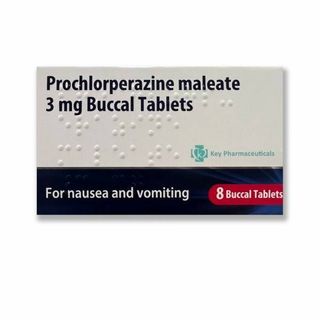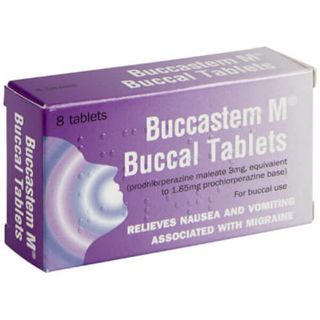
Nausea
Often, just hearing the word ‘nausea’ is enough to send your stomach into somersaults. There are lots of things that can make you feel sick. Pregnancy is one of the main culprits, but travel sensitivity and infections can also give you that queasy feeling. If you’re nauseous, get some fresh air, have a cold drink or try some ginger or peppermint tea. If that doesn’t do the job, you can try taking anti-sickness pills to relieve your nausea and get your day back on track. Our expert team can give you advice on the best medication for your needs.
Nausea Treatments
 Prochlorperazine 3mg Buccal Tablets£23.99
Prochlorperazine 3mg Buccal Tablets£23.99- Out Of Stock

Buccastem M Tablets
Buccastem M Tablets£17.99
Start your assessment for Nausea
Don't wait to get the medical help you need.
Once you complete a short online assessment about your condition, you will be able to select your preferred treatment and quantity from a list of appropriate options for you.
- Reviewed by our UK-based medical team
- Takes less than 3 minutes to complete
- Approved treatments dispatched same day (before 3pm)
Ordering as easy as 1, 2, 3
1. Find the ideal treatment
2. Get a free consultation
3. Enjoy speedy delivery
Advice for Nausea
What is Nausea?
Nausea is an uneasy sensation that you feel the need to vomit, however it does not always lead to vomiting. Nausea is not a condition in its own right as it is often a symptom of other conditions. Some common causes can include; viral infections which can be also known as a 'stomach flu', eating or drinking too much, food poisoning, pregnancy and motion sickness or seasickness.
Nausea is often nothing to worry about in adults and will often clear within a day or two. How ever if it is persistent bouts of nausea that you are experiencing you should seek the help of your GP.
What are the symptoms of Nausea?
Nausea symptoms can be quite hard to describe. Nausea symptoms are not always painful but can be extremely uncomfortable sensations felt often in the chest, upper abdomen, or at the back of the throat. Nausea can be associated with;
- Headache
- Fever
- Diarrhoea
- Gas
- Vomiting
- Dizziness
- Lightheadedness
- Abdominal Pain
How is Nausea diagnosed?
It can be quite difficult to diagnose nausea specifically, as usually it is a symptom of another condition. However frequent nausea can result in vomiting and if this persists for longer than 48 hours, we would recommend going to your GP.
If your nausea is associated with motion sickness this can often be dealt with at a pharmacy, where you are able to buy medication over the counter. Although in severe cases you can consult a GP to get prescribed motion sickness medication.
Finally in more severe cases where nausea leads to bouts sickness where blood is present in the vomit will indicate a condition that requires urgent attention, and you should go to the hospital immediately.
What treatments are available for Nausea?
There are many treatments used to treat nausea. Each treatment used will depend on the cause of your nausea. If you are experiencing persistent episodes of nausea, it may be that you have to see your GP and it will be down to their discretion on what they decide to prescribe or recommend.
In cases where a migraine is causing the nausea, which is fairly common. A drug called Buccastem M may be used, This is a tablet which is placed in the cavity between the gum and top lip. Buccastem M is made up of 3mg of Prochlorperazine and is made into something called a Buccal Tablet.
Alternatives
Non-medicinal alternatives for Nausea
There are quite a few forms of therapy associated with help to reduce or control nausea. These methods will not work as quickly as medication, however they are often a good place to start. There is nothing stopping you from combining these methods with medication if it is needed.
These methods try to reduce nausea and vomiting by:
- Helping you feel relaxed
- Distracting you from what’s going on
- Helping you feel in control
- Making you feel less helpless
Below are some non-medicinal treatments that may help. Most of them have few or no side effects, how ever there is very little scientific evidence that shows this works.
Self-hypnosis
Self-hypnosis can be used to make behaviour changes to help control nausea and vomiting.
Progressive muscle relaxation
Progressive muscle relaxation teaches a person to relax by progressively tensing and relaxing different muscle groups. It’s been used to decrease the nausea and vomiting associated with chemotherapy.
Acupuncture or acupressure
Acupuncture is a traditional Chinese technique where very thin needles are put into the skin. There are a number of different acupuncture techniques, including some that use pressure rather than needles (acupressure). Some studies have found it may help treat anticipatory nausea.
FAQs for Nausea
What is Nausea?
Nausea is an unpleasant sensation in the upper stomach that accompanies the urge to vomit. Nausea can precede vomiting, although it is possible to feel nauseous with out throwing up. A prolonged feeling of nausea can be a debilitating symptom.What causes Nausea?
Nausea is a non-specific symptom, meaning it can have various different causes. Nausea is not an illness itself, but rather a symptom of another condition. The most common causes of nausea are listed below:- Motion sickness
- Migraine
- Pregnancy (morning sickness)
- Intense pain
- Enteroviruses (viruses affecting your intestinal system)
- Gastroenteritis
- Food poisoning
- Dizziness
- Chemotherapy
- Bulimia
- Drinking excess amounts of alcohol
- Medications
What are the symptoms of Nausea?
Nausea symptoms can be difficult to describe. Nausea itself wouldn’t be classed as painful, but rather an uncomfortable feeling felt in the upper stomach and chest. Nausea can have an array of associated symptoms, including:- Vomiting
- Headache
- Fever
- Dizziness
- Abdominal pain
- Diarrhoea
- Gas
- Light-headedness
When do I need to see my GP about Nausea?
Knowing the cause of your nausea will help determine whether you need to visit your doctor. For example; if your nausea is the result of motion sickness, once the motion causing the sickness has ceased, the associated nausea will, in turn, subside. Another example would be nausea caused by overindulging in alcohol. The nausea itself is a related symptom to the excessive consumption, which means once the alcohol has left your system, the nauseous feelings should dissipate. Under these circumstances, a visit to the doctor will likely be unnecessary.If however, you are persistently experiencing nausea, and its cause is unknown, then it is advised to speak with your doctor. Also, you should seek medical advice immediately should you present with any of the following associated symptoms:- Blood in your vomit
- Severe abdominal pain
- A headache and stiffness of the neck
- A persistent feeling of nausea that doesn’t go away in someone who isn’t pregnant
- Dehydration
How can I treat Nausea?
There are a variety of different medicines available for the treatment of nausea. Choosing the right medication will depend on its underlying cause. For example, sufferers of motion sickness and vertigo will likely need antihistamines or anticholinergics.If the nausea is being triggered by a migraine or headaches, then a dopamine antagonist, such as Metoclopramide would be a more suitable choice.Cases of nausea where gastroenteritis is the cause would be more effectively treated with serotonin antagonists, such as Ondansetron. Whereas, Pyridoxine and Doxylamine is usually the first line of treatment when treating pregnancy-related cases of morning sickness.What medicines are used to treat Nausea?
A medicine used to relieve nausea is generally referred to as an antiemetic. There are lots of different types of antiemetic drugs, some of the most commonly prescribed are listed below:- Cyclizine – belongs to a group of medicines called antihistamines. Cyclizine is believed to block the histamine 1 receptor in the part of the brain that creates the sensation of nausea.
- Promethazine – also an antihistamine. This drug works in the same way as Cyclizine.
- Hyoscine – this medicine works by blocking the chemical acetylcholine. It is particularly effective at treating nausea caused by motion sickness and inner ear problems.
- Metoclopramide – this medicine acts in the gut. Metoclopramide works to speed up the transit of food through the gut. This treatment for nausea is often used when the symptoms are caused by gut problems or a migraine.
- Domperidone – like Metoclopramide, Domperidone also works to speed up food transit through the gut.
- Prochlorperazine – this medicine works by blocking a chemical in the brain called dopamine. Prochlorperazine is useful for treating nausea caused by cancers, radiation and opiate medicines, such as morphine and codeine. Prochlorperazine has also proven effective at relieving nausea caused by vertigo and inner ear problems.
Can I use Nausea treatments if I am pregnant?
If you suffer from morning sickness during pregnancy, your doctor or midwife will likely suggest changes to your diet and daily life before prescribing medication. However, if these changes have little effect, or if the morning sickness is particularly severe, then your doctor or midwife may suggest a short-term course of medication.Can Nausea be prevented?
Nausea isn’t always possible to prevent. Trying to manage the underlying cause will be the most effective method for preventing the associated nausea. For example, if your nausea is being caused by your medication, then speaking to your doctor about an alternative should be your first course of action.However, there are steps you can take to help prevent nausea, providing its cause and triggers are controllable. Listed below are some self-help tips that can help prevent nausea under these circumstances:- Eating smaller meals
- Try to avoid foods that are hard to digest
- If the smell of warm foods makes you feel nauseous, try eating foods that are cold
- Eat slowly
- Rest after eating, ensuring your head remains elevated roughly 12 inches above your feet
- Eat during times where you feel less nauseated
- Drink liquids in between meals rather than during them